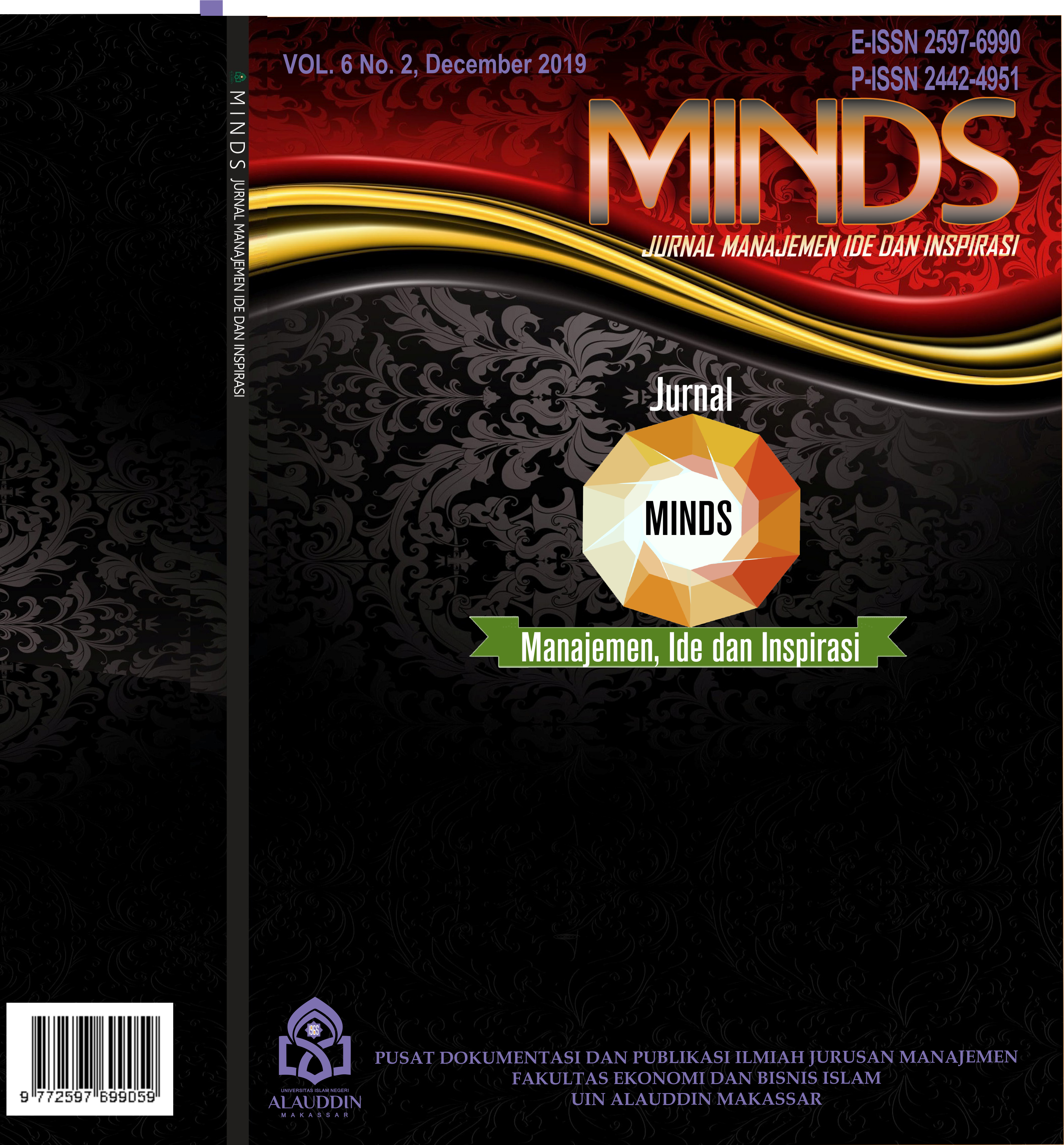Date Log
Copyright (c) 2020 Ika Yunia Fauzia

This work is licensed under a Creative Commons Attribution 4.0 International License.
Enhancing the Literacy of Shariah Financial Technology for Generation X, Y and Z in Indonesia
Corresponding Author(s) : Ika Yunia Fauzia
Jurnal Minds: Manajemen Ide dan Inspirasi,
Vol. 7 No. 2 (2020): December
Abstract
This research tries to improve financial literacy through sharia fintech, especially in payment gateway, peer to peer lending, and crowdfunding. It focuses mainly on how the X, Y, and Z generations may improve financial literacy. The research uses a qualitative approach in analyzing its case study, involving 30 informants in Indonesia who have the knowledge or other ways and access sharia fintech. The research will then select 30 informants and ten people to represent each X, Y, and Z generations. The research shows that X generations are more literate in sharia fintech than Y and Z generations to disseminate and spread sharia fintech and improve its infrastructures and services in its products.
Keywords
Download Citation
Endnote/Zotero/Mendeley (RIS)BibTeX
References
Abdullah, M. A., & Chong, R. (2014). Financial literacy: An exploratory review of the literature and future research. Journal of Emerging Economies and Islamic Research, 2(3), 1-9.
Agustinus, M. (2019). RI juga Butuh Infrastruktur Keuangan Bukan Hanya Infratruktur Fisik. Dalam finance.detik.com diakses 20 Juni 2020 pukul 19.00.
Budiman, A. (2019) Kolom Pakar: Industri 4.0 VS Society 5.0 dalam Fakultas Tehnik Universitas Gadjah Mada, di ft.ugm.ac.id (diakses 27/09/2019, pukul 09.15).
Bungin, B. (2007). Penelitian kualitatif: komunikasi, ekonomi, kebijakan publik, dan ilmu sosial lainnya (Vol. 2). Kencana.
Buhler, C. (1980). Practice Kinder Psychology. Boston: Houghton Mifflin, Co.
Direktorat Jenderal Aplikasi Informatika, Kemetrian Komunikasi dan Informatika. (2018). Big Data, Kecerdasan Buatan, Blockchain dan Teknologi Finansial di Indonesia: Usulan Desain, Prinsip dan Rekomendasi Kebijakan. Jakarta: Centre for Innovation Policy and Governance (CIPG).
Fianto, B. A., Hendratmi, A., & Aziz, P. F. (2020). Factors determining behavioral intentions to use Islamic financial technology. Journal of Islamic Marketing. Ahead-of-print. Accessed from https://doi.org/10.1108/JIMA-12-2019-0252 (25/09/2020).
Er, B., & Mutlu, M. (2017). Financial inclusion and Islamic finance: A survey of Islamic financial literacy index. International Journal of Islamic Economics and Finance Studies, 30(5661), 33-54.
Fauzia, I. Y. (2019). Pemanfaatan Jaringan Internet dalam Transaksi Perspektif Bisnis Islam. Jakarta: PT. Raja Grafindo Persada.
Firmansyah, H. B., & Ramdani, A. L. (2018). The role of Islamic financial technology (FinTech) startup in improving financial inclusion in Indonesia case: In the 3rd International Conference of Integrated Intellectual Community (ICONIC). Available at SSRN: https://ssrn.com/abstract=3194546 or http://dx.doi.org/10.2139/ssrn.3194546
Jepang. (, 2019). Realizing Society 5.0 (Powered by News Pick Brand design) dalam japan.go.jp (diakses 01/10/2019).
Kominfo. (2019). Pemerintah Petakan 6 Fokus Inklusi Keuangan Indonesia Tahun 2019. Dalam kominfo.go.id (diakses 27/10/2019, pukul 21.30)
Kementrian Pendidikan dan Kebudayaan. (2017). Materi Pendukung Literasi Digital: Gerakan Literasi Nasional, Jakarta.
Mannheim, K. (1952). The Problem of Generations in Essays on the Sociological Knowledge. Essays on the Sociology of Knowledge, 24(19), 276.
Otoritas Jasa Keuangan. (2017). Strategi Nasional Literasi Keuangan Indonesia. Dalam ojk.go.id
Peraturan Bank Indonesia Nomor 19/12/PBI/2017 tentang Penyelenggaraan Teknologi Finansial dapat menyelenggarakan aktifitas keuangan.
Putra, Y. S. (2017). Theoritical review: Teori perbedaan generasi. Among Makarti, 9(18), 123-134.
Patria, R. (2020). Tantangan Fintech Sharia di Indonesia. Dalam domainesia.com diakses 20 Juni 2020, pukul 18.22.
PT. Telkom Indonesia. (2017). Kajian Bisnis Fintech Sharia. Bandung.
Puslitbang Kebijakan dan Penerapan Teknologi. (2019). Fintech: Alternatif Pembiayaan untuk Mendorong Pengembangan Ekonomi Wilayah. Dalam http://litbang.pu.go.id/, diakses 20 Juni 2020, pukul 21.00.
Prasad, H., & Devendra, M. (2017). Digital Literacy: A Study of Households of Udaipur. Global Journal of Advanced Research. Vol. 4, Issue 5, PP. 201-2019. ISSN: 2394-5788 201. Accessed www.gjar.org. (30/09/2020).
Romānova, I., & Kudinska, M. (2016). Banking and Fintech: a challenge or opportunity?. Contemporary issues in finance: Current challenges from across Europe. Emerald Group Publishing Limited.
Rumondang, A. (2018, April). The Utilization of Fintech (P2P Landing) as SME's Capital Solution in Indonesia: Perspective in Islamic Economics (Qirad). In International Conference of Moslem Society (Vol. 2, pp. 12-22).
Rusydiana, A. S. (2018). Developing Islamic financial technology in Indonesia. Hasanuddin Economics and Business Review, 2(2), 143-152.
Ryandono, M. N. H. (2018). Fintech Waqaf: solusi permodalan perusahaan startup wirausaha muda. Jurnal Studi Pemuda, 7(2), 111-121.
Siregar, (2016). “Financial Technology Tren Bisnis Keuangan ke Depan”. Diakses pada 1 April 2018 di (http://infobanknews.com) diakses 22 Oktober 2019 pukul 14.55.
Suharyati, S., & Sofyan, P. (2019). Edukasi Fintech Bagi Masyarakat Desa Bojong Sempu Bogor. Jurnal Bakti Masyarakat Indonesia, 1(2).
Hermanto, B., & Tahir, R. (2020). Edukasi Fintech Bagi Pelaku Usaha Mikro, Kecil dan Menengah. Kumawula: Jurnal Pengabdian Kepada Masyarakat, 3(1), 18-28.
Setyowati, A., Harmadi, H., & Sunarjanto, S. (2018). Islamic financial literacy and personal financial planning: a socio-demographic study. Jurnal Keuangan dan Perbankan, 22(1), 63-72.
Setyaningsih, E. D. (2018). Analisis SWOT Implementasi Financial Technology Syariah pada PT Telkom Indonesia. Syiar Iqtishadi: Journal of Islamic Economics, Finance and Banking, 2(2), 73-91.
Tony, N., & Kavitha D. (2020). Impact of Digital Financial Literacy on Digital Financial Inclusion, International Journal of Scientific & Technology Research, Vol. 9: (1). ISSN. 2277-8616 1911. Accessed from http://www.ijstr.org/final-print/jan2020/Impact-Of-Digital-Financial-Literacy-On-Digital-Financial-Inclusion.pdf (25/09/2020).
Sources from internet:
https://www.indopremier.com/, diakses 02/12/2019.
https://www.beritasatu.com/, diakses 04/12/2019.
http://kanal24.co.id/ diakses 02/12/2019.
